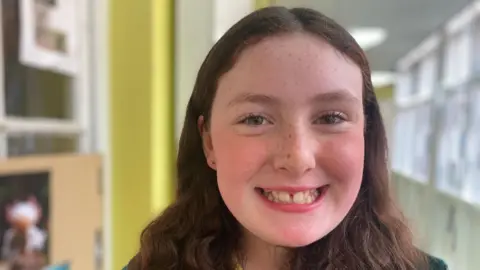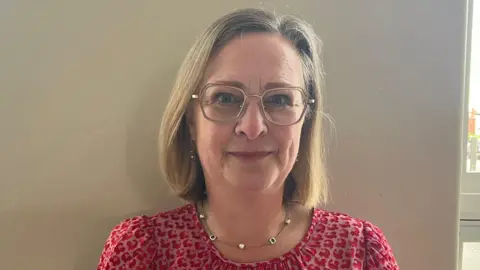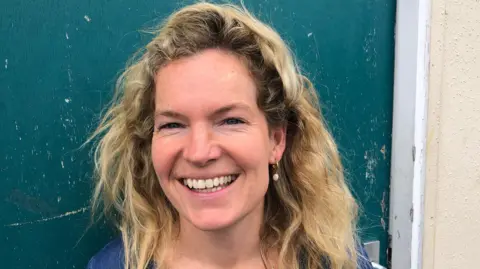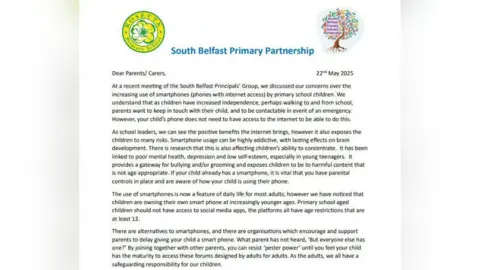School principals sign letter over pupils' smartphone use
 BBC
BBCHead teachers from 14 Belfast primary schools have called on parents to delay giving their child a smartphone.
The principals from the South Belfast Primary Partnership said they had noticed that "children are owning their own smartphone at increasingly younger ages".
They have written a joint letter to parents detailing their concerns about the increasing use of smartphones by children.
Recent research by Ofcom suggested that nearly a quarter of five-to-seven-year-olds in the UK have their own smartphone.
Rosetta Primary School pupil Sophie got her phone as a reward after the transfer test.
She told BBC News NI that her parents thought it was a good time to give it to her because she was "sensible enough to have it".
"I normally just use it for contacting and keeping in touch with friends, and if anything happens, I know to go to them."
Sophie doesn't have social media accounts, and she said she doesn't want to.
"I know some things can happen on them, so I think it's just best to keep off them," she added.

Theo also received a mobile phone after completing the transfer test last year but said he was among the last of his friends to get one, with most already owning phones for "at least a year and a half".
"I just got it as a bit of a present," he told BBC News NI.
He doesn't have social media accounts and said he "probably won't be allowed them".
"I have an hour time limit in the week, and at the weekend I have two hours."
"I'll get extra time if I'm talking to family members or it's one of the holidays."
He said he is not scared of social media, unless he were to "use it in a bad way".
Children 'exposed to risks'
In Northern Ireland, Education Minister Paul Givan has advised schools to restrict pupils from using mobile phones during the school day.
However, there have been calls elsewhere in the UK for parents to delay giving their children smartphones until at least the age of 14.
The heads' joint letter said that "primary school-aged children should not have access to social media apps; the platforms all have age restrictions that are at least 13".
"As school leaders, we can see the positive benefits the internet brings; however, it also exposes the children to many risks," the letter said.
"Smartphone usage can be highly addictive, with lasting effects on brain development.
"It has been linked to poor mental health, depression and low self-esteem, especially in young teenagers."
 Handout
HandoutThe principal of Rosetta Primary School, Thelma Crawford, is one of those who has signed the letter.
Ms Crawford told BBC News NI that the internet could be a "wonderful tool" for children, but all of the principals had experienced "children who have been harmed by having access to a smartphone".
"We very much understand that parents want to keep in touch with their children," she told BBC News NI.
"But they don't need a smartphone with internet access to be able to do that.
"We're not saying that children shouldn't access the internet... but it needs to be used wisely."
'Safeguarding responsibility'
Ms Crawford said she knew it could be a difficult decision for parents about when to get their child a smartphone.
"Every parent has experienced the pester power of 'everybody else has one'," she said.
"If you choose to give your child access, of course that's your right, but then there is advice on how do you keep your child safe and make sure that they're using their smartphone appropriately."
The joint letter said that if children already had a smartphone, there should be parental controls in place.
"There are alternatives to smartphones, and there are organisations which encourage and support parents to delay giving your child a smartphone," the letter said.
"By joining together with other parents, you can resist 'pester power' until you feel your child has the maturity to access these forums designed by adults for adults.
"As the adults, we all have a safeguarding responsibility for our children," she added.
 Handout
HandoutCharlotte Carson has two children, one at St Michael's Primary School in Belfast and one at a post-primary school.
She is a campaigner with the smartphone-free childhood group and welcomed the letter from principals.
"What the principals are doing is recognising the real bind that parents are in," she told BBC News NI.
"They understand the risks, but they also don't want their child to be the only one without a phone."
She said there is a culture of parents rewarding children who have completed their transfer test by buying them a phone.
"We're caught in this really strange paradox of helicopter-parenting on one hand and handing them the means to view hardcore pornography and violent content in their pocket.
"The principals are acknowledging that parents are in this very difficult place."
 Rosetta Primary School
Rosetta Primary School'Smart approach'
Paediatrician Dr Peter Cosgrove has six children, some of whom go to St Bride's Primary School in Belfast.
He is also connected to the smartphone free childhood group.
"We've made the conscious decision not to give them smartphones," he said.
"We've elected to not give them one until they're well into their mid to at least older teens."
Dr Cosgrove said that "everyone comes at it from a different perspective" but backed the joint letter from principals.
"It's a very smart and direct approach from the school leadership," he said.
